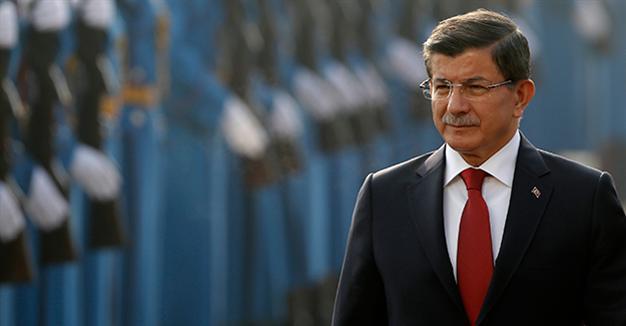Presidential system does not mean dictatorship: PM
ANKARA

Turkey's Prime Minister Ahmet Davutoğlu review the guard of honour during the welcoming ceremony in Belgrade, Serbia, December 28, 2015. REUTERS/Marko Djurica
The presidential system will not be a dictatorship as argued by the opposition parties, the prime minister has said, adding that his proposed model does not contradict universal values and principles.
“I have clearly expressed our proposal to Mr. Kılıçdaroğlu. What is right for Turkey is to adopt the presidential system in line with the [democratic] spirit. This system will not evolve into dictatorship but if we do not have this spirit, even the parliamentary system can turn into this [dictatorship],” Prime Minister Ahmet Davutoğlu said in an interview with told private broadcaster NTV late Dec. 30.
His statements came only hours after a two and half hour meeting with Kemal Kılıçdaroğlu, leader of the Republican People’s Party (CHP) about the new constitution and the government’s plans to change the current parliamentary system into a presidential one.
“There are authoritarian structures coming out of parliamentary systems. Hitler’s Germany was born out of a parliamentary system. We should, therefore, put taboos aside and look at the issues we agree on. Let’s freely discuss which system would be beneficial to Turkey after you make your own proposal,” he said.
The model the government is planning to introduce will meet Turkey’s needs and will have a national character, the prime minister stressed, which will not be in violation of universal democratic values.
“The important [thing] is that all powers are not accumulated in one place. In this regard, the presidential system is the best to provide this if implemented rightly. Are there countries where it’s not implemented rightly? Yes, but let me not name these. At the same time, there are countries where parliamentary systems are spoiled as well.”
The parliament will always have the right to annul or correct presidential decrees according to the system in their minds, Davutoğlu said, while adding that “This issue should not be discussed over personalities,” referring to the opposition’s strong aversion to having Erdoğan as head of this new system.
‘New constitution a must’ One of the top issues the leaders discussed was a new constitution. He said, “Thirty-three years have passed since the adoption of the Sept. 12 constitution. We can no longer live with this constitution.” Turkey’s current constitution was created and ratified during a military junta between 1980 and 1983, which saw the Turkish Army, led by Gen. Kenan Evren, take over power from the government after years of left-wing/right-wing conflict.
According to Davutoğlu, the new constitution should put citizens at its center rather than the state, while highlighting freedoms instead of restrictions.
The prime minister also said an agreement had been reached with Kılıçdaroğlu over the new constitution. The same proposal will be made to the Nationalist Movement Party (MHP) next week, he added. “People pledged us the majority to rule the country but not to change the constitution on our own,” he said, adding that he will seek the support of not only political parties but also of civil society.
‘The HDP will decide’ Regarding the judicial investigation launched against the Peoples’ Democratic Party (HDP) co-chairs Selahattin Demirtaş and Figen Yüksekdağ, Davutoğlu said the government will follow the legal process and evaluate it.
“Nobody has the right to commit a crime because he or she has parliamentary immunity. No group can have the right to lend support to terror,” he said.
Davutoğlu added that “The HDP will make a decision: is it a political party or an affiliation of a terror organization? HDP municipalities will decide whether they will serve the people or will indirectly finance the PKK [Kurdistan Workers’ Party]. They will first decide on these, and then things can be put on the right track.”
Though the Justice and Development Party (AKP) is against party closures in principle, ultimately the decision will in the hands of the judiciary, he said. “I, myself, as the prime minister have to obey the democratic rules of the principle of the rule of law and I have to give account on these rules. HDP lawmakers as well as HDP mayors should obey these rules as well,” he added.
